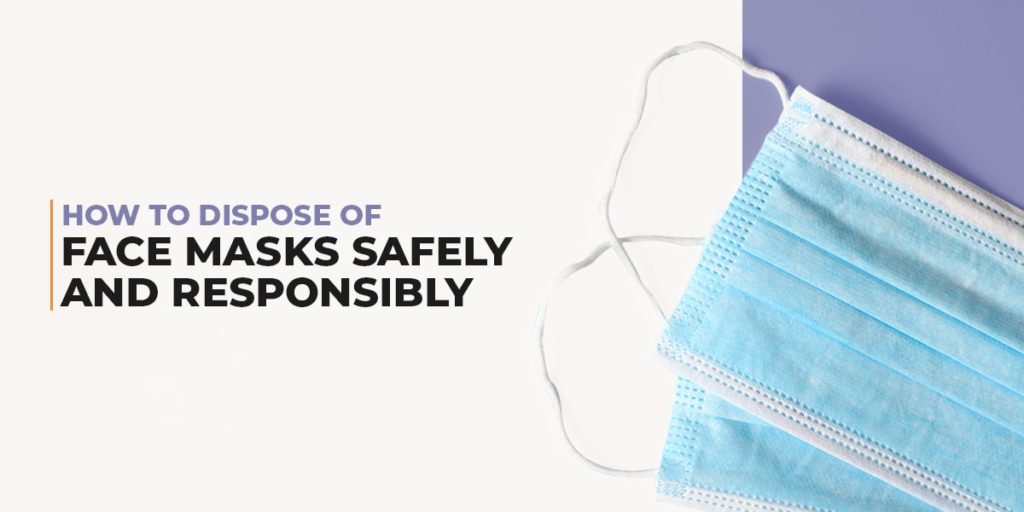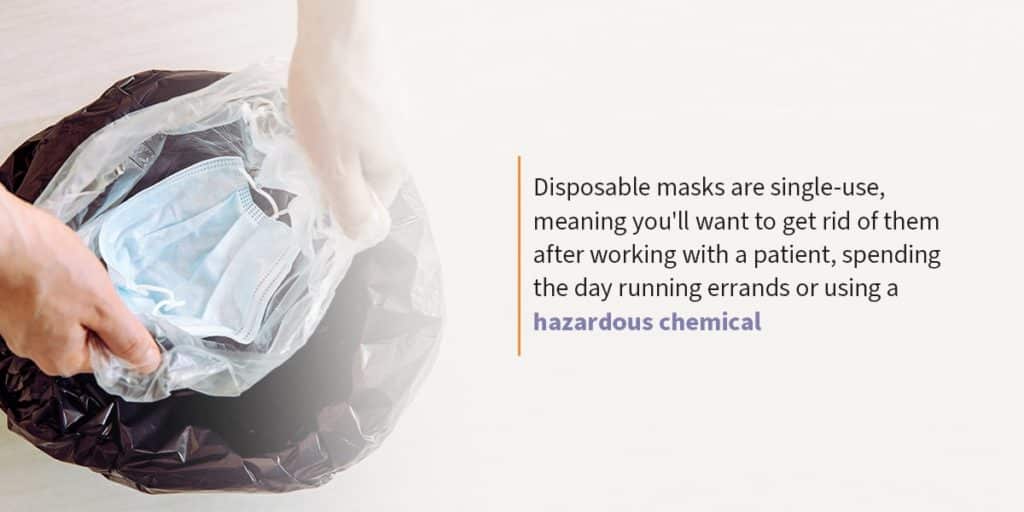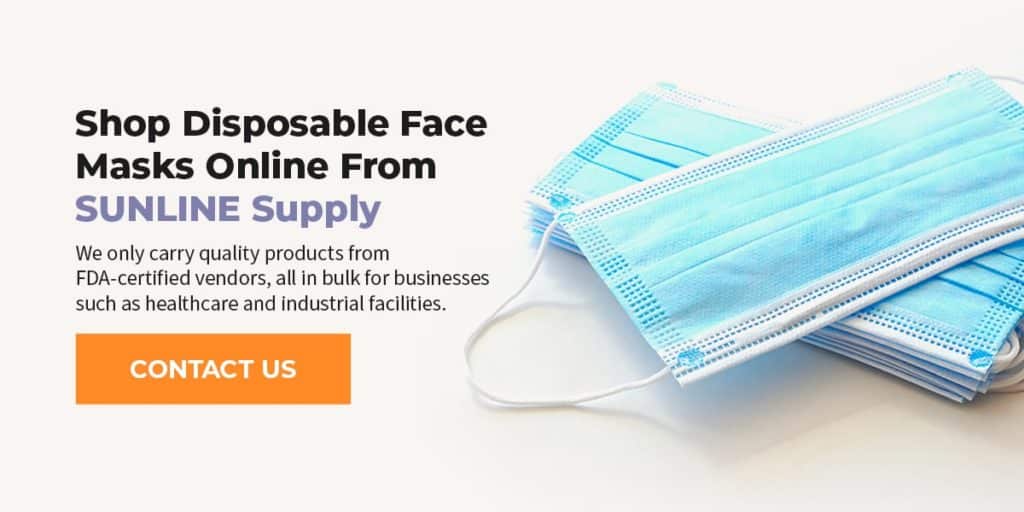
How to Dispose of Face Masks Safely and Responsibly
Face masks are one of the most powerful tools we have against the spread of infectious diseases. They create excellent shields against harmful particulates such as those in industrial environments. From construction sites to grocery stores, face masks are everywhere. But when we finish wearing them, they can become hazards — to other humans and the planet — if not disposed of properly.
The COVID-19 pandemic has created a significant increase in the use of disposable face masks, which has prompted discussions about how we’re getting rid of them and whether we’re doing so safely and responsibly. We’ll be joining the conversation and offering answers to your questions about single-use mask disposal.
The Importance of Proper Face Mask Disposal
When a face mask hits the trash can, its journey is far from over. Throwing away face masks can have significant ramifications for the spread of disease and for the planet. For example, consider the amount of waste generated by increased demands for single-use personal protective equipment during COVID-19. During the peak outbreak in Wuhan, China, hospitals generated more than 240 tons of waste — an exponential increase from the 40 tons they usually produced.
The path of all that medical waste can go in many different directions, too. Some people may treat it carefully and keep it in an enclosed location before disposal, or it may get tossed on the ground, left to enter the ecosystem. Littering and other methods of incorrect disposal from mask wearers can result in health risks and environmental damage.
Knowing how to dispose of a face mask is essential for the following reasons.
- Preventing contamination: Incorrectly contained and discarded masks can spread infection or substances onto the surfaces they touch, whether that’s the hand of a good Samaritan cleaning up a park or recycled plastics in a facility where the mask shouldn’t have gone.
- Preventing waste: The use of disposable masks has skyrocketed and made quite a dent in our global waste generation. Masks are also a terrible form of litter, as they often include plastic fibers that don’t break down and elastic bands that can get caught on wild animals. They can also end up in our waterways and pose pollution hazards, not to mention adding to the infection risk. Any time they aren’t in the proper receptacle, face masks can cause significant problems for the planet and waste management efforts.
These concerns apply in occupational environments and use by the public, from hospital workers to people shopping at the grocery store.

When to Throw out a Disposable Mask
Disposable masks are single-use, meaning you’ll want to get rid of them after working with a patient, spending the day running errands or using a hazardous chemical. The need to replace your mask will depend on demand and the environment you’re in, so use your judgment for everyday wear and follow workplace protocols for occupational wear. In addition, be sure to throw out your mask when it is visibly compromised, such as when the fabric is dirty or torn.
How to Take off a Face Mask
It may seem simple, but correctly taking off a face mask can help prevent the spread of viruses and ensure successful disposal. Taking off your PPE, aka “doffing,” requires that you start with clean hands. Wash them with soap and water or use hand sanitizer. Since the front of the mask is contaminated, you should avoid touching it while doffing and only touch the parts holding the mask in place, such as ear loops, a band or ties. Removal instructions for the various types of masks are as follows.
- Ear loops: Removing a band with ear loops is simple. Hold both loops, lift and remove the mask.
- Ties: If your face mask has ties, start by untying the bottom bow and move up to the top bow, pulling the mask away from your face as you do so.
- Bands: To remove a face mask with bands, pull the bottom strap up and over your head, then the top strap.
In all instances, make sure to use standard trash receptacles — littering is an easy way to spread infection, send masks into the ecosystem and prevent them from correct destruction. Keep the containers closed after throwing away your mask to prevent the mask from moving around, potentially blowing away or falling onto the floor as it makes its way to the landfill.
Face Mask Disposal FAQs
With face masks becoming so widespread in so little time, there are many questions about them. Here are some commonly asked ones.
Can I Recycle Face Masks?
No. Face masks may look like they consist of recycle-bin-friendly paper, but they usually have materials like polypropylene and polyester that won’t do well in the recycling system. They can add a contamination risk, too, creating extra costs and efforts for the recycling company or solid waste facility.
Are Face Masks Infectious Waste?
While some forms of medical waste are infectious and require incineration, disposable masks are not one of those materials. You can discard them the same way as noninfectious waste.
Can You Flush Away Face Masks?
Face masks are not flushable and should not go into the sewer system. They won’t break down as toilet paper does, which can lead to clogs in your toilet and problems for the wastewater treatment plant.
Can You Reuse Disposable Masks?
As the name suggests, you should throw away disposable masks after one use. What qualifies as one “use” will look different depending on the application. Someone running a few errands might be able to go into a couple of stores without much risk, while a surgeon would need to change theirs after one procedure.
For light-duty use, such as an hour or two of shopping, you can get away with reusing your mask a few times or letting it sit in a clean area to decontaminate for several days. For occupational use, the requirements are stricter. If you aren’t sure, check with management or err on the side of caution and get rid of your mask.
These guidelines don’t apply to reusable cloth masks. You should wash these masks after each use, but continue to re-wear them once they’re clean.

Shop Disposable Face Masks Online From SUNLINE Supply
SUNLINE Supply has received certification from the Food and Drug Administration, with an extensive supply of disposable surgical masks and other single-use masks. We only carry quality products from vendors, all in bulk for businesses such as healthcare and industrial facilities. With decades of experience in distribution and importing, SUNLINE Supply is the trusted source for disposable masks.
Browse our bulk disposable face masks today, and reach out to us if you have any questions!

